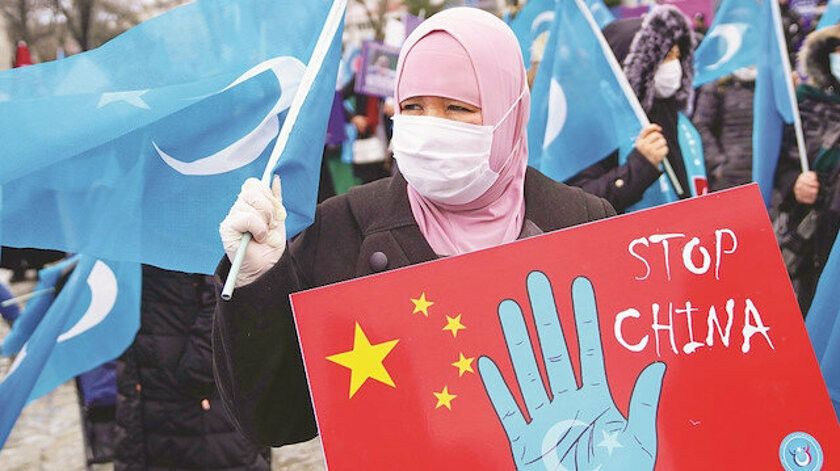An increasing number of deportations of Uyghurs from Muslim countries including Turkey, United Arab Emirates, Egypt, and Saudi Arabia to China raises concerns about Beijing’s growing reach, CNN reported.
China has adeptly navigated the region’s hodgepodge of political fault lines, its friendships across the region transcending political divides, according to the outlet.
Middle Eastern countries in financial dire straits, such as Lebanon, find any overtures from China difficult to resist. Similarly, oil-rich Gulf Arab countries facing a pandemic-induced economic slump also view China as a possible financial lifeboat.
In a 2019 open letter, more than a dozen Muslim-majority countries — including the UAE, Iran, Egypt and Saudi Arabia — publicly endorsed China’s policies in Xinjiang. They were among 37 signatories responding to Western criticism of China at the UN Human Rights Council.
Rights activists fear that countries in the Middle East and beyond will increasingly be willing to acquiesce to China’s crackdown on Uyghurs at home and abroad with the expansion of Beijing’s global influence.
“A lot of these governments don’t care about human rights,” Maya Wang, senior China researcher at Human Rights Watch (HRW), told CNN. “They are unelected governments that persecute their citizens in their countries. There is no real rule of law and democracy when it comes to deportations of Uyghurs.”
China’s treatment of the Uyghurs has drawn international condemnation, with human rights groups estimating that some 1 million Uyghurs have been arbitrarily incarcerated in a network of prison camps.
A report released by HRW in April identified a range of abuses against Uyghurs that amount to offenses committed as part of a widespread and systematic attack directed against a population: mass arbitrary detention, torture, enforced disappearances, mass surveillance, cultural and religious erasure, separation of families, forced returns to China, forced labor and sexual violence and violations of reproductive rights.
The Chinese Communist Party (CCP) denies committing atrocities and abuses against the Uyghurs despite a growing body of evidence. The Chinese government has steadfastly resisted calls to admit independent monitors into the region, allowing only carefully stage-managed tours for select journalists and diplomats.
Resolutions passed by the Dutch, Canadian and British parliaments called China’s repression of Uyghurs “genocide.”
The United States, the European Union, Britain and Canada in March imposed sanctions on several Chinese officials for human rights abuses against the Uyghurs.
For some Uyghurs, the extraditions from Muslim countries are especially galling, shattering notions of Islamic solidarity and deepening feelings of isolation on a world stage where China’s power has grown rapidly.
Even in Turkey, which has traditionally been seen as places of safety for Uyghur Muslims, the sand is shifting. Over the last decade, thousands of Uyghurs have settled in Turkey, with Uyghur neighborhoods and schools cropping up in the country’s major cities.
In addition to sharing a religion with the majority of Turkey’s population, Uyghurs — a Turkic ethnic group — also speak a similar language. An estimated 50,000 Uyghurs are currently living in Turkey, making it the largest Uyghur diaspora in the world.
Yet, as Ankara grows more economically dependent on Beijing, the Turkish government is no longer offering a safe haven or defending Uyghur rights.
An extradition treaty between the two countries, ratified late last year by China and now awaiting approval by Turkey’s Parliament, is exacerbating fears. Turkish officials have sought to reassure Uyghurs, as well as the Turkish public, that they will not extradite Uyghurs back to China.
But at least four Uyghurs, including a mother and her two children, were deported by Turkey to Tajikistan last year, according to CNN. Multiple testimonies suggest they eventually ended up in China.
In March a motion submitted to the Turkish Parliament by the right-wing opposition İYİ (Good) Party calling the Chinese treatment of its Uyghur Muslim minority in northwestern Xinjiang province “genocide” was voted down by Turkey’s ruling Justice and Development Party (AKP).
Source: Stockholm Center for Freedom (SCF)



